Gandhi Jayanti, celebrated on October 2nd every year, is a day of profound significance for the people of India and, indeed, for the entire world. It marks the birthday of one of the most iconic and revered figures in history, Mahatma Gandhi. The man who led India’s non-violent struggle for independence from British rule, Gandhi’s legacy continues to resonate deeply with people from all walks of life. As we approach Gandhi Jayanti 2023, it’s not just a day to remember a historical figure; it’s a day to reflect on his teachings, his principles, and their enduring relevance in our complex and interconnected world.
We will delve into the historical context that shaped Gandhi’s life and his path towards becoming the ‘Father of the Nation’ in India. His philosophy of non-violence or ‘Satyagraha’ and his unwavering commitment to civil rights and social justice continue to inspire individuals and movements worldwide. In an era marked by strife and conflict, Gandhi’s principles remain a guiding light, urging us to seek peaceful solutions to the world’s most pressing problems.
Join us in this exploration of Gandhi Jayanti 2023 as we pay tribute to the man who showed the world the power of truth, love, and non-violence. Let us delve into his life, his legacy, and the enduring importance of his message for a better, more just world.
- ▪ History and Significance of Gandhi Jayanti
- ▪ Why Do We Celebrate Gandhi Jayanti?
- ▪ Remembering Mahatma Gandhi's Legacy
- ▪ Commemorating Non-Violence
- ▪ Importance of Gandhi Jayanti in India
- ▪ Mahatma Gandhi's Role in India's Independence
- ▪ Gandhi's Ideals in Modern India
- ▪ Gandhi Jayanti 2023 Celebrations Around the World
- ▪ Which Are The Best Places to Observe Gandhi Jayanti in India?
- ▪ Gandhi Jayanti 2023: Looking Ahead
- ▪ FAQs on Gandhi Jayanti
History and Significance of Gandhi Jayanti
Gandhi Jayanti, observed on October 2nd, commemorates the birth of Mahatma Gandhi, born in 1869 in Porbandar, India. Gandhi’s commitment to non-violence and civil disobedience, known as “Satyagraha,” led India to achieve freedom on August 15, 1947. In recognition of his enduring impact, Gandhi’s birthday was declared a national holiday, known as Gandhi Jayanti.
Let’s have a look at the significance of Gandhi Jayanti.
Significance:
Championing Non-Violence: Gandhi’s philosophy of non-violent resistance remains an inspiration for movements worldwide seeking peaceful solutions to conflicts.
Embracing Truth and Simplicity: On this day, people reflect on these principles, fostering honesty and straightforwardness in society.
Educational Focus: Educational institutions use this day to educate students about Mahatma Gandhi’s life and teachings, emphasizing his autobiography, “The Story of My Experiments with Truth.”
Global Relevance: Gandhi’s message of peace and non-violence transcends borders, addressing global challenges like conflicts, human rights violations, and environmental issues. It prompts reflection on these universal values.
Gandhi Jayanti festival embodies the enduring principles of non-violence, truth, and social justice that Mahatma Gandhi exemplified throughout his life.
Why Do We Celebrate Gandhi Jayanti?
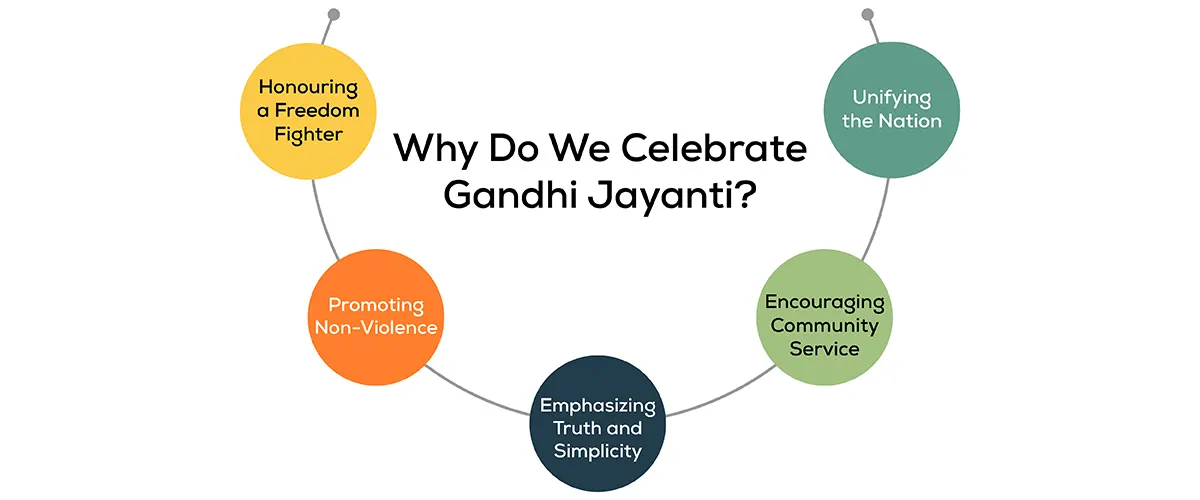
Gandhi Jayanti, celebrated annually on October 2nd, holds a special place in India’s collective consciousness. The celebration on this day carries significant historical and cultural importance, and its observance serves several key purposes:
- Honouring a Freedom Fighter: Gandhi Jayanti is primarily celebrated to honour and pay tribute to Mahatma Gandhi, who played an instrumental role in India’s struggle for independence. His unwavering commitment and sacrifice for the nation are remembered and celebrated on this day.
- Promoting Non-Violence (Gandhi Jayanti Celebration): The day also underscores Gandhi’s principle of non-violence or “Ahimsa,” which was at the core of his ideology. Gandhi Jayanti celebration emphasizes the importance of non-violence as a potent means for achieving social and political change, not just in India but globally.
- Emphasizing Truth and Simplicity: Gandhi’s dedication to truth, honesty, and a simple lifestyle is a significant aspect of this celebration. It encourages individuals and society to embrace these values in their daily lives.
- Encouraging Community Service: Gandhi Jayanti inspires people to engage in acts of service and philanthropy. It reinforces the importance of selfless contributions to society and communities, promoting a spirit of volunteerism.
- Unifying the Nation: Gandhi Jayanti brings together people from diverse backgrounds and regions of India, fostering a sense of national unity and pride in the country’s historical struggle for freedom.
Gandhi Jayanti and its celebration are not just annual events but a profound acknowledgement of the enduring values and principles that Mahatma Gandhi championed throughout his extraordinary life. It continues to inspire generations to strive for a more just, peaceful, and compassionate world.
Remembering Mahatma Gandhi’s Legacy
On this day, we pay homage to the enduring legacy left behind by Mahatma Gandhi, a legacy that continues to resonate across the globe. This celebration is not merely a historical marker but a profound moment to reflect on the profound impact Gandhi had on humanity and the principles he bequeathed to us. It offers a unique opportunity to remember and honour the multifaceted legacy of Mahatma Gandhi:
- Reflection: It is a day for introspection, prompting us to contemplate how we can integrate Gandhi’s values of non-violence, truth, and humility into our lives.
- Inspiration: Gandhi’s legacy remains a potent source of inspiration, motivating individuals, activists, and leaders to strive for a more just and peaceful world.
- Action: On this day, people are encouraged to engage in acts of service and community work, embodying the principles of selfless service that Gandhi advocated.
- Education: Schools and institutions use Gandhi Jayanti to impart knowledge about Mahatma Gandhi’s life and teachings, ensuring that his legacy endures through future generations.
In essence, it serves as a poignant reminder that Mahatma Gandhi’s legacy is not confined to history books but lives on in the hearts and actions of those who seek to follow his path, working tirelessly towards a more compassionate, equitable, and peaceful world.
Also Read: Mahatma Gandhi Jayanti Speech in English
Commemorating Non-Violence
Gandhi Jayanti, celebrated on October 2nd, stands as a prominent festival with non-violence as its central theme. This annual celebration not only pays tribute to Mahatma Gandhi’s enduring legacy but also coincides with the International Day of Non-Violence, a global initiative recognized by the United Nations since 2007.
The International Day of Non-Violence and Gandhi Jayanti Festival:
UN Resolution: The United Nations General Assembly designated October 2nd as the International Day of Non-Violence, aligning it with Mahatma Gandhi’s birthday. This acknowledgement emphasizes Gandhi’s pivotal role in advocating for and employing non-violent methods to bring about profound social and political change, perfectly complementing the essence of this day.
Promotion of Peace: This day serves as a significant platform for promoting the principles of non-violence, tolerance, and peace, all of which Gandhi ardently championed. It encourages individuals, communities, and nations to embrace peaceful means of resolving conflicts, disputes, and differences.
Education and Awareness: Within the framework of the Gandhi Jayanti festival, educational institutions and organizations leverage this occasion to raise awareness about the philosophy of non-violence, encompassing both the teachings of Mahatma Gandhi and its broader application in contemporary society. The festival becomes a stage for learning and reflection.
Conflict Resolution: The International Day of Non-Violence and the Gandhi Jayanti festival jointly underscore the significance of non-violent approaches in conflict resolution. They emphasize that peaceful methods can lead to lasting solutions in situations marked by tension and strife.
Global Participation: The Gandhi Jayanti festival is marked by various events, seminars, workshops, and cultural activities, reflecting the global participation of people from diverse backgrounds. It’s a collective celebration of non-violence and a reaffirmation of commitment to peaceful coexistence, mirroring the goals of the International Day of Non-Violence.
These celebrations reinforce the timeless relevance of non-violence in our complex and interconnected world.
Importance of Gandhi Jayanti in India
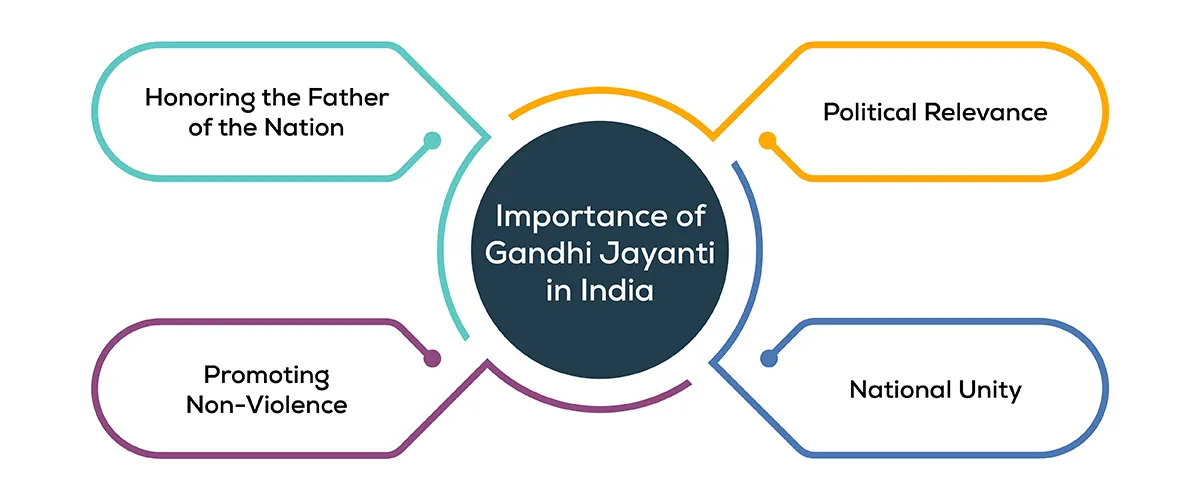
It holds immense importance in India for a multitude of reasons that go beyond the mere commemoration of a historical figure’s birthday. This day is deeply entrenched in the nation’s ethos and continues to play a pivotal role in shaping the country’s cultural, social, and political landscape.
- Honoring the Father of the Nation: Gandhi Jayanti is the day when India pays its utmost respects to Mahatma Gandhi, who is affectionately referred to as the “Father of the Nation.” It’s a moment to remember his unwavering dedication to India’s freedom struggle and his tireless efforts to uplift the lives of ordinary citizens.
- Promoting Non-Violence: Gandhi’s principle of non-violence or “Ahimsa” is at the heart of India’s cultural and social fabric. Gandhi Jayanti serves as a reminder of this principle and encourages individuals to practice non-violence in their daily lives. It promotes a more peaceful and harmonious society.
- Political Relevance: India’s political landscape has been profoundly shaped by Mahatma Gandhi’s ideas and leadership. His advocacy for democratic values, civil rights, and decentralized governance continues to influence political discourse in the country.
- National Unity: Gandhi Jayanti serves as a unifying force in India. Regardless of their cultural, religious, or regional differences, people from all walks of life come together to celebrate the day, fostering a sense of national unity and pride in India’s historical struggle for freedom.
Gandhi Jayanti’s importance in India goes beyond a mere celebration; it serves as a timeless reminder of the values and principles that Mahatma Gandhi advocated. It inspires individuals to strive for a more just, equitable, and peaceful society, ensuring that his legacy remains relevant and impactful for generations to come.
Mahatma Gandhi’s Role in India’s Independence
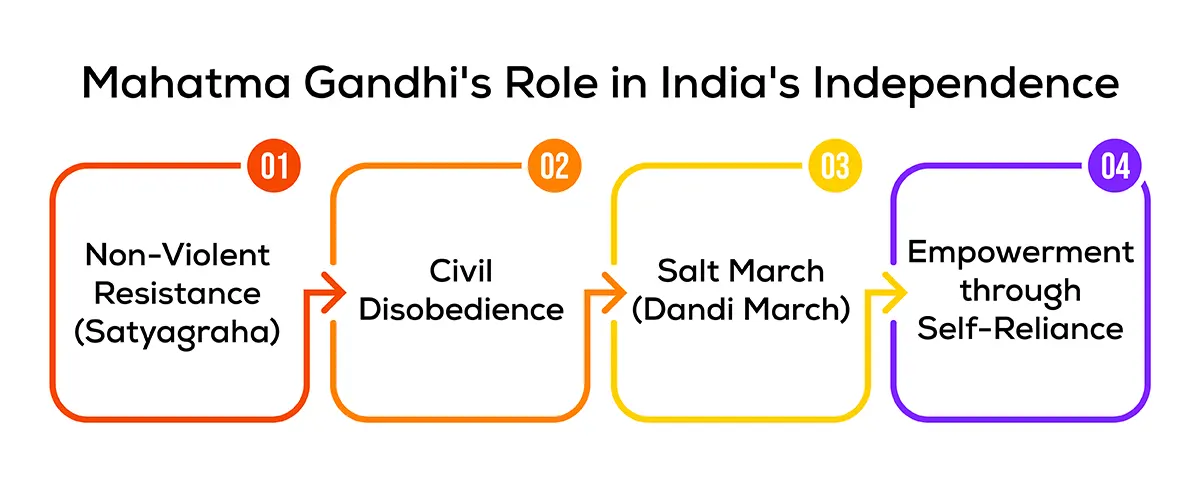
Observed on the 2nd of October, this day stands as an emblematic day in India, commemorating the profound legacy and pivotal role of Mahatma Gandhi in the nation’s quest for independence. 2 October Gandhi Jayanti is a poignant reminder of his leadership and the principles that fundamentally reshaped the course of history.
1. Non-Violent Resistance (Satyagraha): Gandhi’s primary and most enduring contribution was his passionate advocacy and unwavering practice of non-violent resistance, known as “Satyagraha.” Gandhi Jayanti, which coincides with 2 October, reflects the core principle of non-violence that he believed to be a potent force for change, ultimately guiding India toward independence.
2. Civil Disobedience: Mahatma Gandhi’s clarion call for civil disobedience urged Indians to peacefully defy unjust British laws and policies. Iconic movements such as the Salt March of 1930 and the Quit India Movement of 1942, closely associated with Gandhi Jayanti, demonstrated the formidable power of mass non-cooperation in the fight for freedom.
3. Salt March (Dandi March): The Dandi March in 1930, occurring precisely on 2 October, stands as an iconic event in India’s struggle for independence. Gandhi, leading a group of protesters on a 240-mile journey to the Arabian Sea to produce salt, boldly defied the British salt monopoly. This symbolic act galvanized the nation and drew global attention to the cause.
4. Empowerment through Self-Reliance: Gandhi’s emphasis on “Swaraj” or self-rule and economic self-sufficiency, a key element of Gandhi Jayanti, remains a symbol of self-reliance. His call for Indians to spin their cloth became synonymous with the pursuit of self-sufficiency and economic freedom.
2 October Mahatma Gandhi Jayanti serves as an enduring tribute to the life and principles of a visionary leader whose impact on India’s history and the global pursuit of peace and justice remains immeasurable.
Gandhi’s Ideals in Modern India
Gandhi Jayanti, celebrated on October 2nd, marks a moment to reflect on Mahatma Gandhi’s enduring ideals and their profound impact on contemporary India. His principles remain remarkably relevant in today’s complex world.
1. Non-Violence (Ahimsa): Gandhi’s core principle of non-violence guides modern India, emphasizing peaceful solutions to conflicts and promoting global harmony.
2. Tolerance and Religious Harmony: His vision of tolerance and religious harmony resonates in India’s diverse society, fostering unity amid differences.
3. Social Justice and Equality: Gandhi’s fight against discrimination influences modern India’s pursuit of social justice and equal rights for all.
4. Sustainable Living and Environmentalism: His advocacy for sustainability and simplicity aligns with modern environmental concerns and sustainable practices.
5. Grassroots Democracy: Gandhi’s idea of decentralized governance inspires contemporary efforts to strengthen grassroots democracy and local self-governance.
6. Economic Self-Reliance: His emphasis on self-sufficiency informs India’s drive for balanced economic growth and domestic industry.
7. Empowerment Through Education: Gandhi’s belief in education’s transformative power guides India’s investment in empowering its citizens through education.
8. Global Influence: Gandhi’s message of peace and non-violence continues to inspire global leaders and movements, emphasizing the importance of peaceful cooperation in addressing global challenges.
This day reminds us that Mahatma Gandhi’s ideals are not historical relics but enduring principles shaping modern India’s quest for progress, equality, and harmony in an ever-changing world.
Gandhi Jayanti 2023 Celebrations Around the World
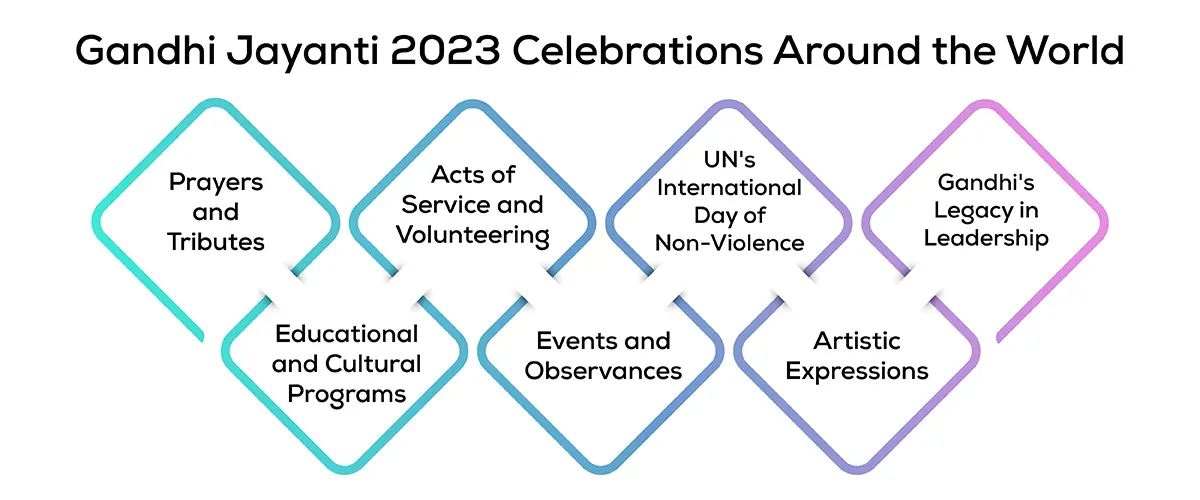
Gandhi Jayanti transcends geographical boundaries and is celebrated worldwide with reverence for Mahatma Gandhi’s enduring legacy. The global observance encompasses various forms of homage, educational initiatives, cultural programs, acts of service, and events to commemorate this remarkable leader.
1. Prayers and Tributes:
- In many countries, including India, people begin the day with prayers and tributes at Gandhi’s statues and memorials.
- Interfaith gatherings and prayers for peace, inspired by Gandhi’s message of non-violence, are held in diverse communities.
2. Educational and Cultural Programs:
- Educational institutions worldwide organize seminars, workshops, and lectures on Gandhi’s life and principles, promoting non-violence and social justice.
- Cultural festivals showcasing Indian traditions, art, music, and dance are held to celebrate his contributions.
3. Acts of Service and Volunteering:
- Many choose to engage in acts of service and volunteer work on Gandhi Jayanti, reflecting his commitment to selfless service.
- Initiatives like community clean-up drives, blood donation camps, and food distribution to the needy are organized.
4. Events and Observances:
- Public events, rallies, and processions are organized to honour Gandhi’s vision of peaceful change.
- Gandhi’s favourite hymns and songs are sung at cultural gatherings, connecting people to his spirit.
5. UN’s International Day of Non-Violence:
- The United Nations recognizes Gandhi Jayanti as the International Day of Non-Violence, fostering awareness about non-violence’s significance in conflict resolution.
- The UN promotes global peace and tolerance, aligning with Gandhi’s principles.
6. Artistic Expressions:
- Artists, writers, and filmmakers create works inspired by Gandhi’s life and ideals, promoting his message to new generations.
- Art exhibitions and film screenings feature his contributions to the world.
7. Gandhi’s Legacy in Leadership:
- Leadership seminars and conferences focus on Gandhi’s principles of ethical leadership and non-violent conflict resolution.
- Renowned leaders share insights on how Gandhi’s ideals continue to inspire transformative leadership.
Gandhi Jayanti’s global celebrations not only pay homage to the “Father of the Nation” but also reaffirm the enduring relevance of his principles in a world striving for peace, justice, and social change. These diverse observances collectively serve as a reminder that Mahatma Gandhi’s legacy transcends borders and resonates with people worldwide, emphasizing the significance of non-violence and truth in creating a more compassionate and harmonious world.
Which Are The Best Places to Observe Gandhi Jayanti in India?
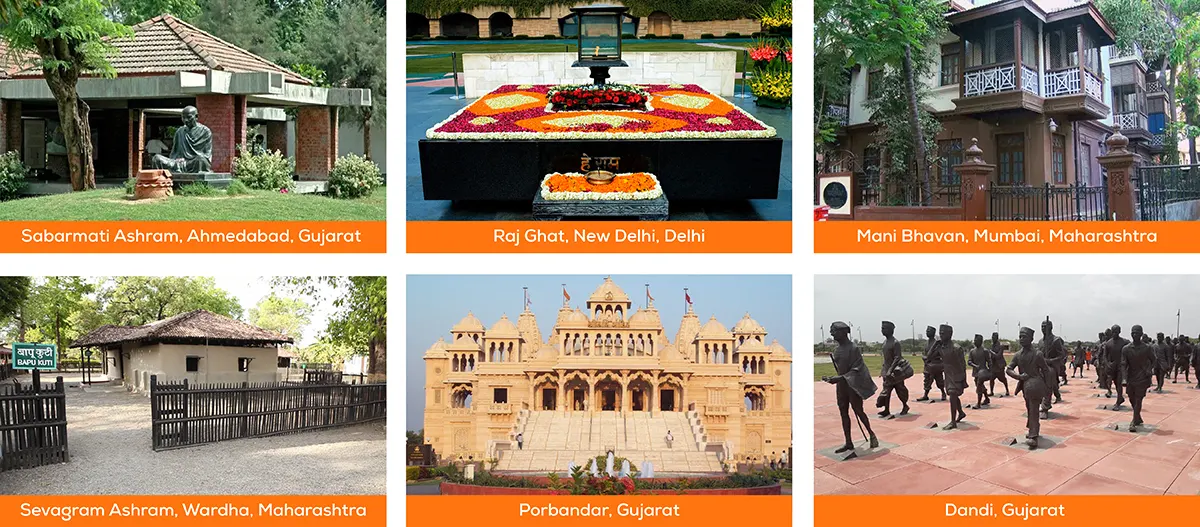
Gandhi Jayanti is celebrated on the 2nd of October across India, with various locations holding historical significance in Mahatma Gandhi’s life and the freedom struggle. These places provide a unique opportunity to immerse oneself in the spirit of Gandhi Jayanti.
1. Sabarmati Ashram, Ahmedabad, Gujarat:
- Sabarmati Ashram was Gandhi’s headquarters during the freedom struggle, and it’s where he initiated many iconic movements.
- Visitors can explore the ashram, view his living quarters, and witness the “Gandhi Jayanti” celebrations that include prayers, speeches, and cultural events.
2. Raj Ghat, New Delhi, Delhi:
- Raj Ghat is the memorial of Mahatma Gandhi, where he was cremated after his assassination.
- On Gandhi Jayanti, dignitaries, and common people pay homage by offering flowers and participating in prayer sessions.
3. Mani Bhavan, Mumbai, Maharashtra:
- Mani Bhavan served as Gandhi’s residence when he was in Mumbai and is now a museum showcasing his life and work.
- On Gandhi Jayanti, the museum hosts events, discussions, and exhibitions dedicated to his legacy.
4. Sevagram Ashram, Wardha, Maharashtra:
- Sevagram Ashram was Gandhi’s residence for a considerable period during the independence movement.
- On this day, visitors can participate in discussions on Gandhi’s teachings, spin the charkha (spinning wheel), and engage in various activities promoting self-reliance.
5. Porbandar, Gujarat:
- Porbandar is Gandhi’s birthplace, and Kirti Mandir, a memorial, houses a collection of his personal belongings.
- The city celebrates Gandhi Jayanti with processions, cultural programs, and lectures on his life.
6. Dandi, Gujarat:
- Dandi is renowned for the historic Salt March led by Gandhi.
- On this day, reenactments of the Salt March, along with cultural events and discussions on Gandhian philosophy, are organized.
7. Champaran, Bihar:
- Champaran is where Gandhi initiated his first major protest against indigo cultivation.
- Gandhi Jayanti celebrations here include lectures, exhibitions, and discussions on his Champaran Satyagraha.
These places offer a unique and immersive experience of Gandhi Jayanti, allowing visitors to connect with the life and teachings of Mahatma Gandhi, honouring his immense contributions to India’s struggle for independence and his enduring legacy of non-violence and truth.
Gandhi Jayanti 2023: Looking Ahead
As we commemorate Gandhi Jayanti in 2023, it’s crucial to reflect on the continued importance of Mahatma Gandhi’s teachings and how they resonate in promoting peace and tolerance in our rapidly changing world.
The Relevance of Gandhi’s Teachings (Importance of Gandhi Jayanti):
- Gandhi’s philosophy of non-violence (Ahimsa) remains profoundly relevant today, offering a powerful approach to conflict resolution in a world marked by strife and tension.
- His emphasis on truth and integrity serves as a reminder of the importance of honesty and transparency in personal and political life.
- Gandhi’s commitment to social justice and equality inspires us to confront and address contemporary issues such as discrimination, inequality, and human rights violations.
- His vision of sustainable living and simplicity guides our efforts to combat environmental degradation and climate change.
Promoting Peace and Tolerance (Importance of Gandhi Jayanti):
- Gandhi’s unwavering commitment to tolerance and religious harmony serves as a beacon in a world often divided along religious and cultural lines.
- His call for unity amidst diversity encourages dialogue and understanding among diverse communities.
- The principles of non-violence and civil disobedience offer practical approaches to resolving conflicts without resorting to violence.
- Individuals and organizations worldwide engage in acts of service, volunteering, and philanthropy, promoting the values of selflessness and compassion.
Looking ahead to Gandhi Jayanti 2023, Mahatma Gandhi’s teachings remain essential for creating a more just, peaceful, and tolerant world. This day is more than a commemoration; it’s a call to action, reminding us of the enduring significance of his principles. It’s an opportunity for us to work towards a better, more harmonious global community.
Celebrated on October 2nd, it is a day for reflection, remembrance, and action. It serves as a timeless reminder of Mahatma Gandhi’s teachings and principles. His life and struggles continue to inspire us to strive for a world marked by peace, tolerance, social justice, and non-violence.
Looking forward, the importance of this day in 2023 and beyond lies in our collective commitment to uphold these ideals. It invites each of us to be agents of change, promoting non-violence, truth, and social harmony in our daily lives and communities.
On this day, let’s pledge to live by Gandhi’s teachings:
- Embrace non-violence in our interactions and conflicts.
- Champion truth, honesty, and integrity.
- Advocate for social justice and equality.
- Practice tolerance and foster religious and cultural harmony.
- Promote sustainability and simplicity in our lifestyles.
- Engage in acts of service, volunteering, and philanthropy.
Gandhi Jayanti is not just a day to remember; it’s a day to act and inspire positive change. Together, we can continue to make a difference in our communities and the world, carrying forward Gandhi’s timeless wisdom.
Also Read: Mahatma Gandhi Essay in English for Students
FAQs on Gandhi Jayanti
Q1. What is special on 2nd October?
2nd October holds special significance as it is the birth anniversary of Mahatma Gandhi, who is widely regarded as the “Father of the Nation” in India. It is a day dedicated to honouring his life, principles, and contributions to India’s struggle for independence and the promotion of non-violence and truth.
Q2. Why do we celebrate Gandhi Jayanti?
Gandhi Jayanti is celebrated to commemorate Mahatma Gandhi’s life and his relentless efforts in leading India to independence through non-violence and civil disobedience. It encourages reflection on his teachings and their relevance in today’s world, inspiring individuals and communities to strive for a more just and peaceful society.
Q3. What should be the main points for a Gandhi Jayanti essay?
You can use the following structure for Gandhi Jayanti essay:
• Introduction: Briefly introduce Mahatma Gandhi and Gandhi Jayanti.
• Gandhi’s Life and Struggles: Discuss his early life, his role in India’s independence, and key movements (e.g., Salt March, Quit India Movement).
• Gandhi’s Principles: Explain his core principles like non-violence (Ahimsa), truth (Satya), and civil disobedience.
• Legacy: Highlight Gandhi’s lasting impact on India and the world, including his influence on civil rights movements globally.
• Relevance Today: Discuss how Gandhi’s teachings remain relevant in promoting peace, social justice, and tolerance.
• Conclusion: Summarize his significance and the importance of celebrating Gandhi Jayanti.
Q4. What are a few ways for Gandhi Jayanti’s celebration?
People can commemorate the day using the following ways:
• Observing a moment of silence and prayer.
• Organizing cultural programs, speeches, and discussions on Gandhi’s life and teachings.
• Participating in acts of service and volunteering, such as community clean-up drives or blood donation camps.
• Visiting places associated with Gandhi’s life, like Sabarmati Ashram or Raj Ghat.

